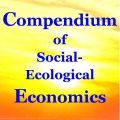Subsidiary Specialization and Division of Labour
Subsidiary Specialization and Division of Labour as One of 17 Principles of Regional Economic Order Under the Maxims Democracy and Market Economy.
An Article in the Compendium of Market-Based Social-Ecological Economics
Key issues in view of the neoliberal crisis:
How can we guarantee employment and fair income?
How can we protect the environment effectively?
How should we shape the economic globalization?
What should the economic sciences contribute?
What must be the vital tasks of economic policy?
How can we legitimize economic policy democratically?
Click here for the list of all articles: Compendium
Click here for the German-language version: Subsidiäre Spezialisierung und Arbeitsteilung
Table of Contents
|
Overview
 In view of the threatening extent of the devastations caused by the neoliberal economic doctrine, the turning towards compatible economic principles becomes almost existential. But only when these principles are combined to form a model of sustainable regional and global economic order, can the urgently needed economic policy measures be derived.
In view of the threatening extent of the devastations caused by the neoliberal economic doctrine, the turning towards compatible economic principles becomes almost existential. But only when these principles are combined to form a model of sustainable regional and global economic order, can the urgently needed economic policy measures be derived.
All 6 global principles are summarized in the article Principles of Global Economic Order in the form of questions. The supplementary 17 regional principles are listed in the article Prinzipien regionaler Wirtschaftsordnung, also as questions.
In the context given here, the term »regional« refers to largely homogeneous entities, currently primarily nation states and supranational political and economic areas (unions), that meet all the requirements for political sovereignty and economic autonomy and are therefore in a position to form a viable foundation for the prosperous coalescence of the world. Hereafter, these entities are mostly referred to as economic areas.
The European Union (EU) and, in particular, the euro zone existing within the EU, can serve as a cautionary example here. Both are supranational entities that have emerged from the political and economic self-interest of powerful players, and whose inhomogeneity and centralism have since unfolded great destructive potential (as a supplement see the article Demokratie und europäische Integration).
Preliminary Remarks
In the course of the historical economic development in Europe and the USA democracy and market economy have emerged as useful and reliable Maximes of Economic Order. Both maxims have, however, been distorted by the neoliberal indoctrination since the 1990s to such an extent that the »natural principles« inherent in them are hardly perceived by the citizens any more. It is therefore essential to return to these principles and to combine them into a model of a sustainable regional and global economic order. See also the article Market and Market Economy.
In contrast to the centralistic structures produced by modern Neoliberalism, the model presented here is based on decentralized structures, or, better still: on subsidiary structures. Only if the citizens in as many countries as possible are recognizing democracy and market economy in their interaction again as convincing maxims, can a culture of political co-determination and economic self-determination return to society, politics and the economy and work towards social and ecological justice. Embedded in subsidiary structures, the citizens bear full responsibility for their actions and well-being, so that they are always brought to shape the conditions in their immediate environment in exchange with each other and at the same time create the preconditions and the foundation for global exchange.
Social and ecological justice, by the way, arise from a multitude of economic mechanisms: For example, the terms Efficiency and Productivity as well as specialization, which are wrongly defined in the neoliberal context, are redefined in the sense of social justice and ecological sustainability and are no longer subject to the arbitrariness of »liberalized« (unregulated) markets, but to economic policy control. The market thus regains the freedom it deserves, which enables it under meaningful and uniform framework conditions, rules and standards to allocate economic resources efficiently and equitably like no other mechanism.
Thus, the price is able to perform its original function again as the central information medium and control element of market transactions of individual economic players, because under the conditions of social and ecological justice and productivity it reflects all internal and external costs. By allowing the players to be guided by truthful prices resulting from the interplay of supply and demand, economic resources move – as if steered by an »invisible hand« – to where they provide the greatest benefit to individuals and, at the same time, to society as a whole. As a supplement see the article Economic Pricing.
Subsidiary structures ensure that prosperity and welfare are no longer at the mercy of the imponderables of a worldwide production quantity achieved under oligarchic rule and high capital concentration, but result automatically from the domestic production structure. The production structure alone is decisive for local and regional economic diversity and consequently for the level of employment, the performance-related equal distribution in society and the preservation of natural resources.
Unlike domestic competition, international competition can not, by its very nature, be granted the freedoms of regulated domestic markets. It must rather be based on bilateral trade agreements given the completely different traditions, standards and resources in the world. In these agreements the exchange rate must be set as the crucial trading link, supplemented by autonomous tariffs and trade quotas to balance out the differences and to grant trade profits to both sides. The primary objective of these agreements must be to ensure that imported products with their characteristics and prices are integrated into domestic competition in the most stimulating but harmless way possible.
The separation into regional and global order thus results quite naturally from the principle difference between domestic and foreign trade. Besides, this explains why there can be no superordinate, all-dominant, self-regulating and self-stabilizing world economic order in a desirably diverse and democratic world. For more details see the article Future-Proof Foreign Trade.
Among politically sovereign and economically autonomous nation-states and economic areas, the global order is reduced to agreements of norms of conduct, especially regarding norms of international trade and cooperation. By applying these norms, economic subsidiarity can be extended beyond national borders and find its perfection at the global level in the form of projects of global interest and scale.
With domestic and cross-border subsidiarity the doctrinal practice of transferring economic powers from lower to higher levels (especially nonstate) is overcome, of which neoliberal protagonists claim it would bring about »more appropriate« and »more efficient« decisions. Along with overcoming this practice, the justification is removed for a World Trade Organization, which is entrusted by its current 164 member states as the guardian of the Grail of global cut-throat competition based on dumping prices in lead currency (i.e. US dollar or euro). This is an unprecedented event in economic history, especially because the condition for membership is the (voluntary) renunciation of national economic autonomy.
It should be noted that the demarcation of the specific functions of the various economic levels, i.e. the subsidiary structure of autonomous nation-states and economic areas both domestically and beyond their borders, is absolutely crucial for the future viability of economically autonomous entities and for the global economy as a whole:
|
Functioning regionality is a prerequisite for sustainable globality. Globality is the complement of functional regionality. |
|
In what follows, is the plea for subsidiary specialization and division of labour as one of 17 principles of regional economic order: |
3. The Subsidiary Specialization and Division of Labour
 Specialization and division of labour regain their true significance in a subsidiarily structured economy, while at the same time overcoming the neoliberal tendency towards complete territorial specialization. Two types of specialization are to be distinguished: The specialization in final products, which naturally results from the particularities of local raw materials and production techniques and produces globally unique specialities, and the specialization in intermediate products and advance services, which also results from local positives, but additionally from the technical production advantages of value creation based on the division of labour. This type of value creation, which corresponds to the original understanding of division of labour, usually starts during the planning or development stage, when it is unavoidable or expedient to forge together the specific skills of several otherwise independent companies into a continuous value chain for a novel production process or a new product.
Specialization and division of labour regain their true significance in a subsidiarily structured economy, while at the same time overcoming the neoliberal tendency towards complete territorial specialization. Two types of specialization are to be distinguished: The specialization in final products, which naturally results from the particularities of local raw materials and production techniques and produces globally unique specialities, and the specialization in intermediate products and advance services, which also results from local positives, but additionally from the technical production advantages of value creation based on the division of labour. This type of value creation, which corresponds to the original understanding of division of labour, usually starts during the planning or development stage, when it is unavoidable or expedient to forge together the specific skills of several otherwise independent companies into a continuous value chain for a novel production process or a new product.
Within subsidiarily structured economic areas, ideal conditions prevail for both types of specialization: The starting point is equal opportunity in competition, which extends across all levels and all company sizes and has a huge potential of different ventures for the development of new technologies and products, including the option of value creation based on the division of labour, so that the whole variety of productions can develop decentrally and produce local specialities. Even under conditions of division of labour, the constant process of subsidiarization ensures that the socially and ecologically compatible size of companies is always restored. Concentrations of economic capital and economic power with the consequence of oligopolies and monopolies, which are solely interested in high territorial production output and maximum return on investment, regardless of social and environmental concerns, are thus structurally excluded.
Subsidiary specialization and the division of labour built upon it can also be continued beyond the borders of economic areas. Provided, however, that the participating economies handle their cooperation and their trade in intermediate products and advance services – analogous to their trade in end products – on the basis of comparative, relative advantages (more on this in the above linked article Principles of a Global Order). Even then, the above-mentioned types of specialization come into effect. In addition to country-specific specialities and raw materials that are offered as end products, intermediate products and advance services that are part of internationally organized value chains can be traded. In both cases, natural specialization exists because both end products and intermediates derive from unique local advantages. However, cross-border subsidiary specialization and division of labour is not limited to goods and services, but is also suitable for private-sector networked research and development programs and for cooperation at state level (see also the article Economic Subsidiarity).
|
Subsidiarily structured domestic economies, which conduct their foreign trade multibilaterally on the basis of comparative relative advantages, thus simultaneously create ideal conditions for profitable intraregional and international specialization and division of labour for both final and intermediate products. |
The practical development of subsidiary economic structures under the conditions of the neoliberal globalization as an entry into a post-neoliberal economic order is dealt with in the article Building Subsidiary Economic Structures.
Note on the COVID-19 Pandemic
The pandemic has noticeably revealed the significant weaknesses of the neoliberal economic system for everyone, above all the shortage of medical, but also other products, caused by disruptions in the absurdly networked value and supply chains across the globe.
The analyses of the neoliberal system as well as the principles and practical procedures based on them for building a sustainable system, which are presented in this compendium, thereby obtain an unexpected topicality. Now is the time to seize the opportunity and build up economic policy pressure to enforce the development of an economic order that is sustainably oriented towards social and ecological welfare.
The following article refers to the targeted arguments contained in the Compendium: COVID-19 and Globalization
___________________________________________________________________________________
Click here for the German-language version: Subsidiäre Spezialisierung und Arbeitsteilung.
